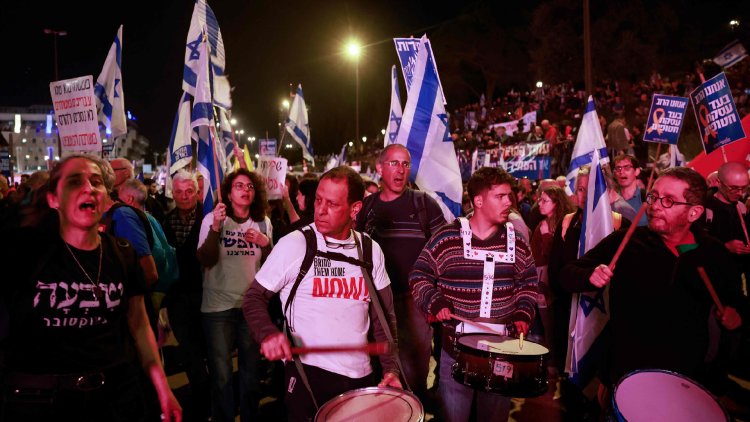Political turmoil in Israel as conflict with Gaza escalates
Israel is currently experiencing significant political turmoil in the wake of a renewed Gaza conflict, exacerbated by Prime Minister Benjamin Netanyahu's controversial decisions that have sparked some of the largest protests in the nation’s...

On Saturday evening, hundreds of thousands of Israelis from vibrant Tel Aviv to historic Jerusalem flooded the streets in protest. Their collective demonstration was ignited by Netanyahu’s decision to dismiss Ronen Bar, the head of the Shin Bet. This action came amidst allegations that Bar was investigating corrupt financial ties involving high-ranking aides and the Qatari government.
Critics argue that the dismissal is not a move aimed at bolstering national security, as Netanyahu has asserted, but instead an effort to suppress investigations that could reveal substantial corruption within his administration.
Netanyahu justified Bar's firing as a necessary measure to "restore trust" in the security apparatus of the state. However, this explanation has only fueled public outrage. In a defiant letter, Bar stated that the government failed to provide any substantial evidence for his dismissal, cautioning that such a move would undermine the Shin Bet's effectiveness at a time when its role is crucial. He suggested that the timing of his ouster was intentionally designed to obstruct the ongoing investigation into unlawful financial dealings that might endanger national security.
The supreme court has intervened to halt Bar's dismissal, stating that it must first review petitions filed by the opposition. Netanyahu has countered this court order by asserting that it is the government’s prerogative to appoint the head of the Shin Bet.
Supporters of Bar, along with various opposition leaders, maintain that his dismissal constitutes a direct assault on the democratic process, jeopardizing what little checks remain on executive power in the country.
This internal conflict represents a continuation of a long-fought ideological battle in Israel, which has been embroiled in a tug-of-war between right-wing factions advocating for a politically influenced judiciary and those upholding the principle of judicial independence as essential to democracy. The Israeli left has consistently accused Netanyahu’s administration of seeking to reform the judiciary, which the prime minister and his allies allege has been dominated by leftist elites since Israel’s inception.
The recent decision by the cabinet to pursue a no-confidence motion against Attorney General Gali Baharav-Miara has further fueled tensions. As Baharav-Miara has routinely challenged government actions she views as illegal, she now faces an impeachment process led by Justice Minister Yariv Levin. Opposition leaders, including former Prime Minister Yair Lapid, caution that if Netanyahu continues his campaign to silence dissent within state institutions, it may lead to unexpected civil unrest, including a general strike that could disrupt daily life.
Compounding these tensions, renewed military operations in Gaza have heightened the nation’s collective anxiety. Following the breakdown of a two-month ceasefire, Israeli airstrikes have resumed with devastating intensity, resulting in numerous civilian casualties and further energizing the protests. Families of hostages still held in Gaza have participated in the demonstrations, expressing their despair and calling for an immediate ceasefire and a just hostage exchange.
The overlap of anti-war activists with those opposing recent government actions highlights a populace caught between an urgent desire for peace and the growing fear that internal fractures are eroding the nation from within.
A recent poll conducted by Israeli TV Channel 12 indicated that 63 percent of Israelis are worried about the future of the country’s democracy. Notably, even among those who supported Netanyahu’s right-wing coalition, 37 percent expressed concerns about the trajectory of Israel's democratic institutions.
As the nation hovers on the brink of what some observers warn could escalate into a constitutional crisis, the supreme court is poised to make rulings on both Bar’s dismissal and the impeachment motion against Baharav-Miara. These legal challenges are expected to shape Israel’s political landscape for years to come, determining whether the country will maintain its current course or reaffirm the checks and balances that the Israeli left advocates.
Lucas Dupont for TROIB News












